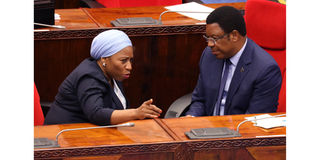Members of Parliament react after health insurance bill postponed

Prime Minister Kassim Majaliwa in a tete-a-tete with minister for Health Ummy Mwalimu at the parliament in Dodoma yesterday. PHOTO | SAID KHAMIS
What you need to know:
- Stakeholders in the health sector deemed it unhealthy for the government to delay the bill due to a finance issue
Dar es Salaam. The Universal Health Insurance (UHI) bill has once again been delayed, with the National Assembly Speaker, Dr Tulia Ackson, saying the move was made to make room for additional consultations, particularly regarding the area of financing.
Members of Parliament (MPs) who spoke with The Citizen yesterday claimed that the bill, which was scheduled to be tabled for second and third readings yesterday, is not ready, particularly when it comes to providing financial assistance to 15 million Tanzanians who are regarded as being in poverty.
The bill was first tabled in parliament in September 2022, after being postponed for several years, and was in November last year to be deliberated and passed. However, the parliament decided to return it to the Social Services and Community Development Committee for further consultations.
“The bill will not be tabled today because the discussion between the government and the committee (Parliamentary committee for Social Services and Community Development) is still going on,” Dr Ackson said.
The delay, she said, was meant to make some improvements, especially on budget or financing.
“The bill will be tabled in the Parliament after the government and committee finalise discussions on the financing area,” said Dr Ackson.
MPs also questioned the source of long-term funding for healthcare, particularly for Tanzania’s poor.
The Sh340,000 proposed in a bill for a family of six could not be afforded by the majority of Tanzanians, according to the lawmakers.
“We previously had CHF (Community Health Fund) that required a person to pay only Sh30,000, but still some could not make it,” said Ms Sophia Mwakagenda (Special Seats-Chadema). Her sentiments were seconded by Prof Kitila Mkumbo (CCM-Ubungo), who said the bill was not ready for tabling.
The committee’s chairman, Mr Stanslaus Nyongo, said they were at the final stages of fixing the gaps and reaching consensus with the government.
“We are reviewing some areas,” said Mr Nyongo without mentioning them. “We need to come up with something better for Tanzanians,” he added.
Stakeholders in the health sector deemed it unhealthy for the government to delay the bill due to a finance issue and urged it to think outside the box by presenting alternate financing options. Insurance expert from the Africa College of Insurance and Social Protection (ACISP), Anselim Anselim, said the government alone was not capable of financing the UHI. “It (government) should look for other ways of funding and confidently be able to answer the question on how much is needed and how it will be increased,” he recommended. He cited some of the other financing options, such as earmarked levies, which are mandatory and specifically collected for earmarked public purposes, as well as performance bonds.
Other financing options are social bonds, sin taxes (an excise tax specifically levied on certain goods deemed harmful to society and individuals), and alternative risk financing options.
“Technically, there is something wrong; the law should be enacted first, and the guidelines for the implementation of the regulations could come next,” said Mr Anselim.
His sentiments were echoed by the former president of the Medical Association of Tanzania (Mat), Dr Elisha Osati, who said the law would be brought into place first before other issues, including financing, followed.
“We are very disappointed by what is going on, and we don’t know what the intention is,” said Dr Osati.
Health minister Ummy Mwalimu was not in a position to comment yesterday.
The current Mat president, Dr Deusdedit Ndilanha, seemed to have been reading from the same script when it comes to the need for the government to diversify its sources of financing.
He said funds for financing the UHI should come from reliable and sustainable sources like tourism attractions, mineral and oil sectors, as well as luxury goods such as sweets, alcohol, and cigarettes. “The biggest challenge that causes the bill to stall frequently is a lack of sustainable sources of funds. We need to think big to address this challenge,” recounted Dr Ndilanha.
“We health experts really wanted the bill to be tabled in Parliament because it has great benefits for Tanzanians,” said
Head of the Medical Council Harold Adamson commended the postponement, saying it will provide room for improving the bill in the interests of the public.
“This is a good move. It tells us that the government and parliament listen to each other,” said Dr Adamson.
“I can’t wait to see the Universal Health Insurance materialise. This will be a solution to the challenge of high treatment costs,” he added.
According to the World Health Organisation (WHO), health financing is a core function of health systems that can enable progress towards universal health coverage by improving effective service coverage and financial protection.






